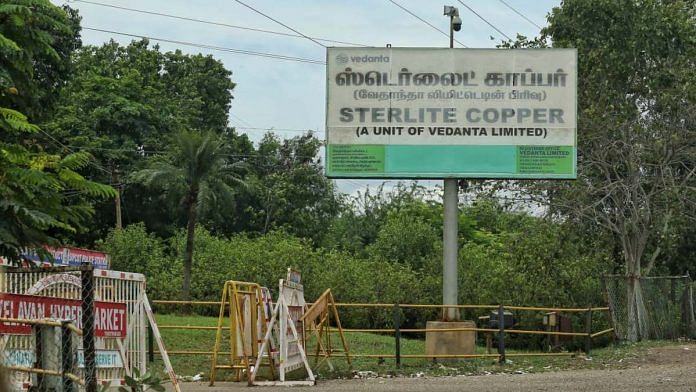New Delhi: Mining major Vedanta suffered a setback Thursday as the Supreme Court dismissed its petition against a 2020 order of the Madras High Court directing closure of the Sterlite Copper smelting unit in Thoothukudi, Tamil Nadu.
A three-judge bench led by Chief Justice D.Y. Chandrachud pointed to repeated violations by the company to justify the unit’s closure. “Closure of industry undoubtedly is not a matter of first choice. However, the repeated nature of breaches, coupled with the severity of the violations (did) not let the statutory authorities nor the High Court take any other view, unless they were to be oblivious of their plain duty,” the bench said.
The court’s decision came after it heard lengthy arguments advanced on behalf of Vedanta as well as the Tamil Nadu government which put up a stiff opposition to the company’s appeal.
The bench said it was mindful of Vedanta’s contribution to the productive assets of the nation in providing employment and revenue. However, it said, the company cannot ignore other well-settled principles, including that of sustainable development and the polluter pays principle and public trust doctrine.
“The health and welfare of the residents of the area is again a matter of utmost concern. In the ultimate analysis, the State Government is responsible for preserving and protecting their concerns,” the court said.
“After careful evaluation of the factual and legal material, we have come to the conclusion that the Special Leave Petition by the industrial unit does not warrant interference under Article 136 of the Constitution.”
The top court also refused to set aside critical remarks made by the high court against the Tamil Nadu Pollution Control Board (TNPCB). It dismissed the Board’s appeal that challenged the observations made regarding its inaction against Vedanta.
“We are of the view that the HC was justified in making those observation in regard to the lack of alacrity on the part of the TNPCB in discharging its duties,” the bench said.
Thursday’s order came even as the top court had earlier this month expressed the option of forming an expert committee for an objective and an independent evaluation of the situation. The bench was of the view that the independent panel would verify compliance of conditions that were imposed on the mining company. It had asked the state to collaborate to work out a comprehensive modality that best served public interest.
But Tamil Nadu had questioned the need for appointing an expert committee, particularly in view of a detailed finding given by the HC in its 800-page judgement. The HC verdict was delivered on Vedanta’s petition against the Tamil Nadu government’s order to close down the plant.
The closure order, Tamil Nadu informed the top court, was issued due to extensive pollution in the surrounding area and the company’s inability to take corrective measures, despite several recommendations.
Terming it a ‘rogue industry’, Tamil Nadu said Vedanta was guilty of repeated misrepresentation, suppression and fraud to the authorities and courts. It submitted details of actions and penalties the company has faced in international jurisdictions.
Moreover, the company, it argued, had failed to comply with the conditions imposed on it by the top court in its 2013 judgement.
Contrary to what Vedanta claimed in the HC, the state said, the SC judgement did not wash away the state’s findings of pollution prior to 2013. It added the HC judgement established that the unit was a polluting one. This was in breach of the conditions imposed on the unit by the state government under the Air and Water Acts, as well as the Hazardous Waste Rules.
Also, the unit operated without consent, which, the state told the bench, was in teeth of the top court’s strong observations in the 2013 judgement in which the latter had penalised the company for functioning without valid consent between 1997 and 2012
(Edited by Tony Rai)
Also Read: Himachal govt wins tussle over Shimla’s Wildflower Hall as SC dismisses Oberoi Group firm’s appeal



